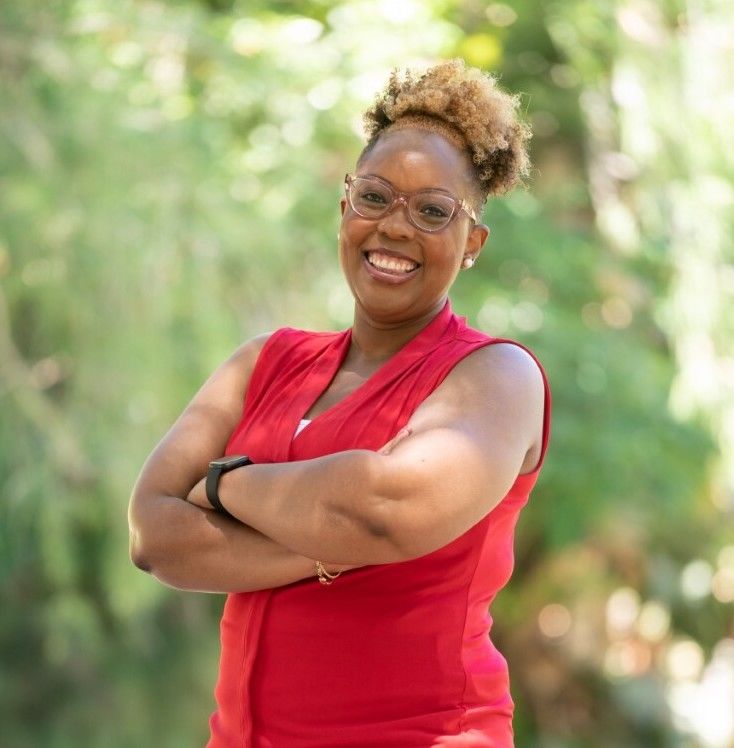
Tiffany Montgomery
Tiffany Montgomery, who joined the College of Public Health’s nursing department this year as assistant professor, has been named associate editor of Nursing for Women’s Health, the Association for Women's Health, Obstetric and Neonatal Nurses (AWHONN) practice journal. As the first Black editor of any AWHONN scholarly publication, Montgomery plans to approach the job with the same purpose she brings to her research and teaching.
“I’ll do my best to ensure that others with diversity of thought and experience come alongside me,” she says. “I may be the first, but I will not be the only one.”
Montgomery’s work concentrates on two broad areas: reproductive health disparities in vulnerable women and the push for diversity in nursing education. She came to Temple after earning her PhD in nursing at UCLA, a master of science in health policy research from the University of Pennsylvania, and postdoctoral research at Drexel’s College of Nursing and Health Professions. Though she started as an assistant professor in July, she arrived at the College of Public Health early to work as an adjunct in January, taking junior nursing students to Temple hospital for their maternity clinical rotation.
“I wanted to get acclimated before I hit the ground running,” she says.
Montgomery’s research in reproductive health disparities at CPH includes updating and testing a sexual health intervention that she began putting together for her dissertation. It’s a program aimed at 18- to 24-year-old Black women that involves educational text messages, images and links sent to participants over the course of eight weeks, with the idea of positively influencing decisions. Montgomery adapted the curriculum from Sister-to-Sister, a skills building program designed to reduce sex risk behaviors and prevent STD infection among African American female clinic patients, developed by Loretta Sweet Jammott, a mentor for her studies. Montgomery saw that not every woman who is vulnerable comes into a clinic, so she converted it from a face-to-face intervention into one built around text messaging.
“As a labor and delivery nurse, and then in the OB-GYN clinic, I noticed that with young women who are most at risk for STDs and unplanned pregnancy, we only saw them when there was a problem. They didn't come in for routine care,” she explains. “So my question was, ‘How do we get to them before they need to get to us?’ Then I looked up, and noticed everybody was texting.”
Montgomery recruited a panel of advisors from the target population of women, who helped her refine the messaging. “They helped me think about what platform to use, how we should recruit participants to the study,” she says. “I recruit using social media, which is why I try to have a lively social media presence.”
Montgomery hopes to see if there's a difference in behavior outcomes among the women who get the text messaging program, those who get normal sexual health education, and those who don't get anything, she says. She points out that the disproportionate rate of STDs among Black women is not because of their sexual behaviors. “When you really look at the data, it is not that Black women are having sex with significantly more partners than white women. That's not happening. There are systemic issues like location of residence, access to housing, to healthcare,” she says.
Montgomery also intends to continue her drive for more diversity in nursing education and scholarship.
“As a first generation college student getting my nursing degree, it was very difficult for me to find mentors who looked like me,” she says. “Had I not minored in African American studies, I would have gone through college with no Black instructors.”
In January she plans to relaunch Nursing DREAMS, Inc., a nonprofit she founded to offer support and connections for aspiring nurses of color. “I know how hard it can be to not have access to the same networks that some of our counterparts have access to. I started this organization to be able to provide financial support for minoritized students, to provide mentorship, and just sort of give them a leg up, because they're starting from behind,” she explains.
She sees Temple’s College of Public Health as an ideal place to pursue these goals and make a difference.
“I love the commitment to social justice that the university has, particularly the College of Public Health. When I interviewed with the college, I got a chance to sit down with folks from the Office of Community Engaged Research and Practice. And I'm, like, ‘Wait, your college has an Office of Community Engagement?’,” she says. At some other universities, she says, when she described her research interests to administrators, “I felt like I was doing a dissertation defense again. They were questioning me about why I did what I did. At Temple, people were like, “Yo, we love this. Let's talk about how to collaborate.’ I knew this is where I needed to be.”
